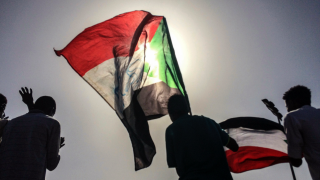After months of negotiation amidst massive protests, on Saturday, August 17 2019, the Sudan Transitional Military Council (TMC) and the main opposition coalition, the Forces of Freedom and Change (FFC) has finally signed a power-sharing deal to pave the way for a civilian-led government in the next three years.
The deal was signed by Mohamed Hamdan Dagalo, deputy chief of the TMC, and Ahmed al-Rabie, a representative for the main opposition coalition. Heads of states, prime ministers and dignitaries from several countries including Ethiopian Prime Minister Abiy Ahmed, who helped negotiate the deal, South Sudanese President Salva Kiir, Chairperson of the AU Moussa Faki Mahamat, and representatives from Egypt, Saudi Arabia and the UAE were in attendance at the ceremony.
While the military council has ruled Sudan since the ouster of Omar al-Bashir, the power-sharing deal creates a joint military and civilian sovereign council that will rule for three years and three months until elections can be held for Sudanese citizens to vote in a leader of their choice. The sovereign council will be made up of 11 members – five members each from both sides, and one civilian chosen through a consensus by both parties.
According to the agreement, the sovereign council will be chaired by a military leader for the first 21 months, then a civilian leader for the next 18. The deal also provides for the establishment of a legislative assembly, and the establishment of an independent investigation into the repression and killing of protesters by security forces.
On Sunday, August 18 2019, the FFC named five people as civilian members of the sovereign council; the selected members are Aisha Mousa, Siddig Tower, Mohamed Elfaki Suleiman, Hassan Sheikh Idris and Taha Othman Ishaq, all of whom are to be sworn in today, Monday, August 19 2019.
However, only three of five members of the military council have been named. According to Shams El-Din Kabbashi, spokesperson for the military council, they are Abdel Fattah al-Burhan, head of the TMC; Mohamed Hamdan Dagalo, deputy head of the TMC, and Lieutenant General Yasser Al-Atta, member of the TMC.
As part of the agreement, the FFC has nominated economist Abdalla Hamdok as prime minister. Hamdok has served as deputy executive secretary of the U.N. Economic Commission for Africa since 2011. He has also worked as a senior policy analyst and economist on governance issues, public sector reforms and regional integration. He is expected to be appointed tomorrow, Tuesday and sworn in on Wednesday.
Hamdok has his work cut out for him. Since the secession of South Sudan in 2011 that took away the bulk of oil earnings, Sudan has been suffering from a deepening economic crisis. Mismanagement and deep-seated corruption of Bashir’s administration, coupled with trade sanctions by the United States further aggravated the country’s economic crisis resulting in cash shortages, inflation, and unending queues for food and gas.
Hamdok has the challenge of reviving Sudan’s dying economy, restoring peace in conflict-affected regions, lifting the country off the list of state sponsors of terror, and large debts with defaulted loans.







